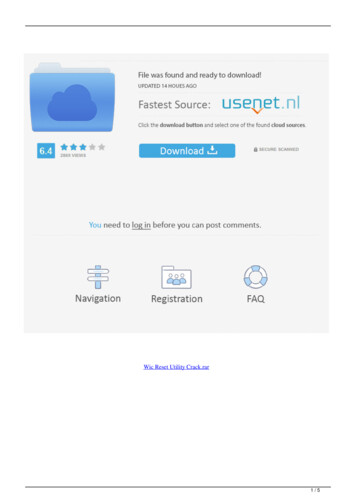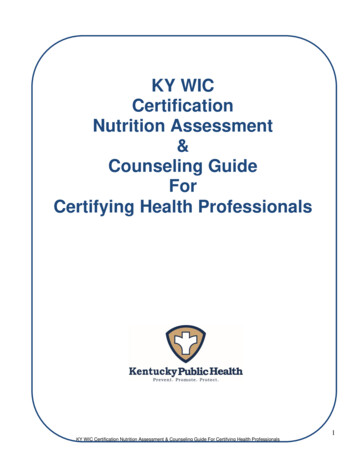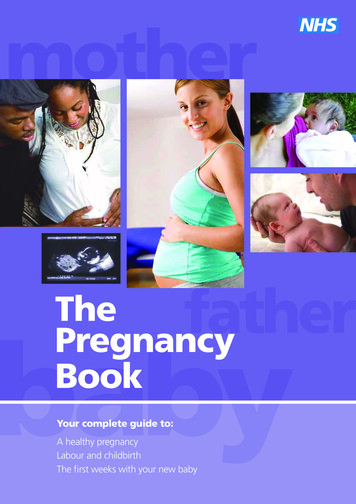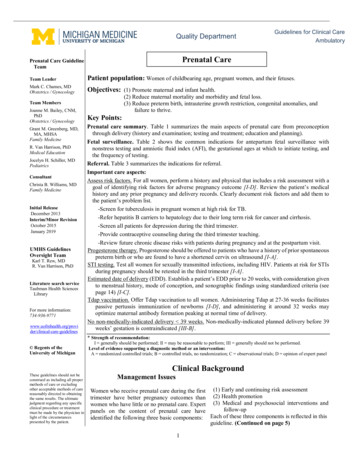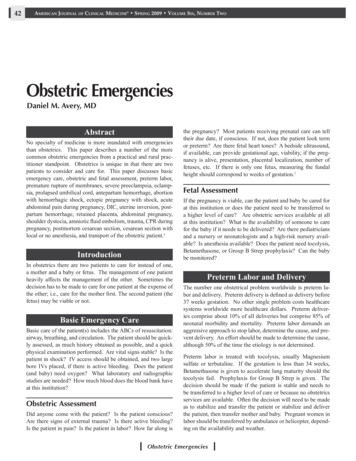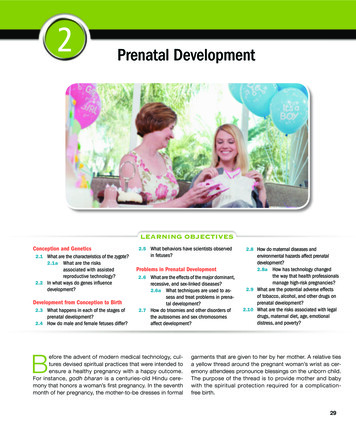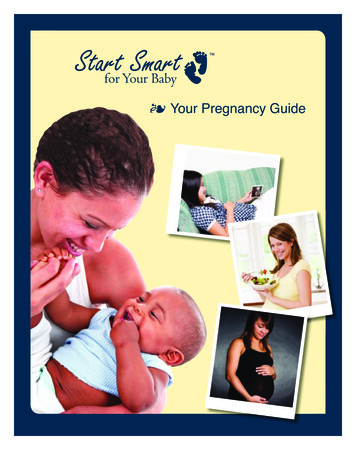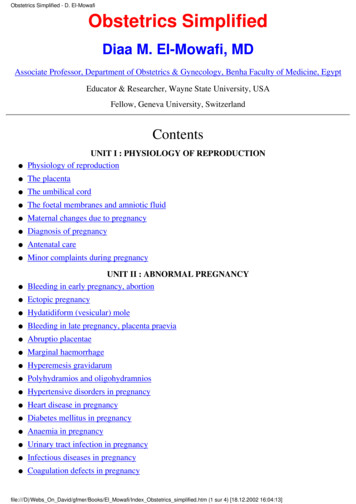
Transcription
pregnancyMaryland WICGuide to ahealthy
Contents1Your Pregnancy and WIC2Your Important Numbers for a Healthy Pregnancy4Your Baby Grows Best When You Eat Well64 Ways to Choose Healthy Foods9What Can’t I Eat?10Is It Safe?13How Much Weight Should I Gain?14Staying Active153 Habits to Kick to Keep Your Baby Safe16Getting Comfortable17Give Your Baby The Right Start—Breastfeed!188 Breastfeeding Basics20Take Care of YouMy To Do Listo Make appointment withmy doctoro Write down questions formy doctor and WICo Ask WIC about breastfeedio Start eating healthy WICfoodso Sign up for Text 4 Baby ng
Your Pregnancy and WICYou’re expecting a new baby. There is so much to think about anddo to get ready! If you’re like most moms-to-be, having a healthy baby isalways on your mind. Your doctor should be number one on your list forhealth advice. The answers you need could be different from what workedfor your sister or best friend. So always go to the source.Get news you can use. WIC can support your pregnancy in so manyways. When your next benefits are due, you may go to group sessionsor work with WIC staff one-on-one. At these visits, you get health tips,share ideas, ask questions, and get information to help your pregnancygo smoothly.What kind of information will I get? Getting the most from your WIC benefitsLearning to breastfeed your babyFocusing on how to make smart food decisionsKeeping your baby safeConnecting with health care providers, dentists, and otherservices to keep you and your baby healthyThere’s a lot to learn before your baby is born, even if thisis not your first baby. Your friends and family will tell youthat each pregnancy is different, just like each baby.Many women tell WICthat writing down theirquestions before eachdoctor’s visit helpedthem to rememberimportant things.1
Your Important Numbersfor a Healthy PregnancyGet prenatal care soon and often. Having a baby is the most naturalthing in the world. But check in regularly with your health care provider tobe sure things are going well. A doctor or nurse who is specially trained totake care of you while you are pregnant will check that you and your babyare okay. They can answer your questions about how your baby is growingand how your body is changing. They will also catch any problems early,and work with you to manage them so all goes well.How many prenatal checkups do I need?1 checkup each month for the first 6 months2 checkups each month in months 7 and 81 checkup each week in month 9How long should my pregnancy last?39Your baby needs at leastweeks to grow and develop before birth.If you have signs of labor before then, call your doctor right away.What if I can’t afford prenatal care?Ask WIC about theMaryland Children’s Health Program (MCHP).To learn more, call1-800-456-89002
How will I know when I am in labor?5 common signs of labor include:Regular or frequent contractions– a tight feeling in your uterusthat may not hurtCramps that feel likeyour periodIncreased pressure on yourpelvis or vagina – like your babyis pressing downLow, dull backacheIncreased leaking or bleedingfrom your vaginaHow many checkups do I need after my baby is born?1 checkup about 6 weeks after your baby is born.This is a great time to talk to your doctor about your future pregnancyplans and birth control options.3
Your Baby Grows Best When You Eat WellChoose foods for you and your baby, too.Each of the 5 food groups offers different thingsyou and your baby need. Try to eat from all ofthese food groups each day. It’s okay to eatmore than one serving of a food at some mealsand none at another meal.GRAINS — 6 servings1 slice bread or 6-inch tortilla1/2 bagel or whole wheat bun1/2 cup cooked cereal, rice,or noodles1 cup cold cerealAt least half the grains you eatshould be whole grains, likeoatmeal, brown rice, or cornor whole wheat tortillas orbread. They help you reduceconstipation and manageyour weight.4VEGETABLES — 5 servings1/2 cup raw or cookedvegetables1/2 cup vegetable or tomatosoup4 ounces vegetable ortomato juice1 cup fresh salad greensEat many kinds and colors.Dark green or orange vegetablesare rich in vitamin A. Enjoy themevery day to keep your eyesand skin healthy and protectagainst infections.
FRUITS — 4 servings1/2 cup fruit1 apple, orange, or peach4 ounces 100% fruit juiceHave a vitamin C fruit every daylike oranges, berries, melonsand WIC juices. Vitamin C helpsyou absorb more iron fromother foods.PROTEIN — 6 servings1/4 cup meat, chicken, turkey,or fish1 egg1/4 cup beans or tofu1 tablespoon peanut butter2 tablespoons nutsMeat, chicken, turkey, fish, andbeans give you lots of iron tokeep your blood strong. Beansand lentils are very low in fat.DAIRY — 3 servings8 ounces nonfat or 1% milk1 cup lowfat yogurt1 or 2 slices lowfat cheeseDairy foods offer calciumand potassium to build strongbones and teeth and lowerblood pressure.If it is hard to drink milk,get ideas from WIC.FATS, OILS, & SWEETSAdd a little healthy fat like oliveor canola oil, avocados, nuts,and seeds. They keep yourcholesterol low. But they arehigh in calories. Just 5 or 6teaspoons a day is enough.5
4 Ways to Choose Healthy Foods1 Eat three meals and three snacks throughout the day.That’s the best way to keep your energy up, and your weight gain ontarget. Here is an example, using all the food groups.You can get most of these foods with your WIC benefits.BREAKFASTCereal lowfat milk walnutsWhole wheat toast peanut butterBananaOrange juiceMORNING SNACKPlain lowfat yogurtBerries or pineapple chunksLUNCHChili with beansShredded lowfat cheeseCorn tortillaLettuceTomatoAvocadoWater6AFTERNOON SNACKCelery sticks apple wedges peanut butterDINNERBaked chickenBrown riceCarrotsBroccoliLowfat milkEVENING SNACKFruit salad
2 Snack smart.Hungry between meals? For healthy weight gain, pick a favorite from thefive food groups, like one of these:Tomato juiceBananaLowfatyogurtCheese crackersNuts raisinsLowfatpuddingHard boiledeggCereal3 Get good food on the go.Your life is really busy, and it doesn’t slow down just because you’repregnant. When you’re out and about and need a quick meal, ask aboutthe calories in your favorite foods. Fast food shops must give you thatinformation. These are most likely to be good choices: Grilled chicken sandwich with lettuce and tomatoSingle hamburger or cheeseburger with a side of coleslawMain dish salad or side saladPizza slice topped with green peppers, tomatoes, and mushroomsFruitWater, lowfat milk, or 100% juice7
4 Try mini meals.Most women have morning sickness sometime in the first three monthsof pregnancy. Other women feel there is little room left for food rightbefore their baby is born. At other times they’re just too tired to cook.If you don’t feel like cooking or eating very much, try a mini meal.Pick a food from each food group in the chart below. Mix and matchyour favorites. You decide how much.8GRAINSDAIRY & PROTEINFRUITS & VEGETABLESBagelLowfat cheeseAppleBaked potatoCottage cheeseBananaCold cerealFrozen lowfat yogurtGrapesCrackersLowfat milkMelonEnglish muffinMilkshakeOrangeGraham crackersLowfat puddingPeachWhole wheat bunLowfat yogurtPineappleNoodlesCanned beansRaisinsNoodle soupCooked chickenStrawberriesOatmeal or gritsCooked meatBroccoliPita breadHard-boiled eggCarrotsRaisin breadEgg saladGreen peppersRiceHamburgerRaw spinachRollNuts (like walnuts)TomatoWhole wheat breadPeanut butterTomato soupCorn or wholewheat tortillaSunflower seedsVegetable soup
What Can’t I Eat?Are there things I can’t eatwhile I’m pregnant?Yes. When you are pregnant, your immunesystem does not fight germs like it did before.It is best not to eat certain foods, see thelist to the right. These can hurt you andyour baby.Can healthy food make meand my baby sick?Even healthy food can make you and yourbaby sick if germs come along for the ride.Follow these steps to keep your food safe. Wash your hands with soap and waterbefore you eat or fix food.Wash vegetables, fruit, and all bagged,pre-cut vegetables and fruit with waterbefore eating or cooking. Cook meat, chicken, turkey, fish, andseafood to the well-done stage. Cook hot dogs, cold cuts, and deli meatslike bologna or ham until steaming hotbefore eating. If you eat fish one or more times aweek, ask WIC or your doctor for moreinformation.XSome foods toAVOIDwhile pregnant: Raw or rare meat,chicken, or turkey Raw or soft-cookedeggs Deli meat spreadsor patés Unpasteurizedraw milk Unpasteurizedjuice or cider Raw sprouts, likealfalfa sprouts Cheese made fromraw milk includingfeta, blue-veinedcheese, Brie, orMexican style(queso blanco orqueso fresco)9
Is It Safe?Can I take vitamins whileI’m pregnant?Yes. Take the prenatal vitamins your doctorrecommends. They have extra iron and folic acidto help your baby grow. Take the pill with water.If this is hard for you, talk to your doctor aboutother choices. If it upsets your stomach, take itat night before you go to bed.Ask your doctor if you should take a 150 microgram(mcg) iodine supplement.Talk to your doctor before you take any other supplements.What about herbal teas and herbal supplements?Some herbs might hurt your baby. If you take herbs or drink herbal teas,ask your doctor if it is safe.Is it safe to take medicine while I’m pregnant?Talk to your doctor about any medicine before you take it. Many are safe,but even aspirin, laxatives, or cold tablets could hurt your baby.I’ve heard fish is good for me. Is it safe whileI’m pregnant?Some fish is very good for both you and your baby. It can keep your hearthealthy and help your baby’s eyesight and brain develop properly. But someseafood can hurt your baby. Always AVOID these while you’re pregnant: 10Tilefish, swordfish, king mackerel, or sharkCrab mustardRaw fish like sashimi or sushi made from raw fish
Is it safe to see a dentist while I am pregnant?Yes. Get a dental checkup every 6 months. To keep your gums and teethhealthy, be sure to: Brush your teeth at least 2 times a day with a soft toothbrush.Floss your teeth 1 time a day.Tell your doctor if your gums bleed when you brush or floss.Drink water, not sugar sweetened drinks.If your gums are swollen, rinsing with salt water may help them feelbetter. Mix 1 teaspoon of salt with 1 cup of warm water. Rinse yourmouth. Spit out the rinse.If you vomit with pregnancy, rinsing with baking soda solution can helpprotect your teeth. Mix 1 teaspoon of baking soda with 1 cup of warmwater. Rinse your mouth. Spit out the rinse.If you have diabetes, pre-diabetes, or gestational diabetes, be sure totalk to both your doctor and your dentist. People with diabetes getoral health disease more easily, and oral health disease can make yourdiabetes harder to manage.Reminder: Medicaid covers oral health services for children up toage 21, including young WIC moms, and pregnant women, while youare pregnant.Get more information on dental care at:www.healthyteethhealthykids.orgSelect oral health during pregnancy during pregnancyTo locate free or low cost dental care near you, click theFind a Dentist button at the top right,or visit: phpa.health.maryland.gov/oralhealth11
Is it safe to exercise while I’m pregnant?Your body stays healthy and fit when you move it.If your doctor says it is okay, try to be active for 30minutes a day. Walking works well when you’repregnant. Some women do it this way.Walk 10 minutes after breakfast after lunch after dinnerWhat about vaccinations while I’m pregnant?Talk to your doctor about getting these safe vaccinations while youare pregnant.What: Tdap VaccineWhen: After you are 20 weeks pregnant.Why:It protects you from getting pertussis, also known as whoopingcough, and passing it on to your infant after birth. It also helps protectyour baby while he is too young to get the shot himself. Youwill also pass on this immunity when you breastfeed your baby.Pertussis is very dangerous for babies.Protect your baby from anyone who could pass on Whooping Cough.Have dad, grandparents, caregivers, and friends get a pertussisvaccination at least two weeks before meeting your baby.What: Flu Vaccine, the inactivated type.When: Before or during flu season, while you are pregnant.Why:12Getting the flu while pregnant can lead to serious problems, evenhospitalization. Like Tdap, it protects your baby until he is oldenough for his own vaccination.
How Much Weight Should I Gain?While pregnant, many women are hungry most of the time.But forget the old wives’ tale. You are not “eating for two” adults. Yourbaby is small, so you only need to eat a little more than before you werepregnant. Your doctor will tell you how much weight gain is right for you.WhenThenYou gain too much weight It’s hard to lose the weightafter the baby is bornYou don’t gain enough weight Your baby can be be born toosmall or too soonYou gain the right amount Your babygrows well You canlose theweight afteryour baby is born.Try to get your weight gain just right.Eat only when you feel hungry.Eat healthy foods, like the onesyou get from WIC.Drink water when you get thirsty.Keep active by walking.Based on your BMI, your recommendedweight gain is .13
.14
3 Habits to Kick to Keep Your Baby SafeIf you have any of these habits, now is the time to get help.Call the numbers below, or ask WIC for a referral.1 Smoking2 Drinking alcohol3 Using drugsIf you smoke or usee-cigarettes (vape),your baby could be:If you drink beer, wine,liquor, or mixed drinkswhile you are pregnant,your baby could:If you use illegaldrugs or abusemedications, yourbaby could: Born too small ortoo sick to liveAt risk for cribdeath (SIDS)At risk for problemslike asthmaGet help to cutback or quitsmoking.Talk with yourdoctor or call theMaryland TobaccoQuit Line at1-800-QUIT NOW. Be born with birthdefectsHave health orlearning problemsEven one drink oncein a while could hurtyour baby. Be born too smallor too sick to liveBe born with birthdefectsHave health orlearning problemsfor lifeGet help to quit drinking or using drugs.Talk with your doctor or call the Substance Abuseand Mental Health Services AdministrationHelpline at 1-800-662-HELP.15
Getting ComfortableBeing pregnant is hard work. As your baby grows and your bodychanges, you may be uncomfortable. You might feel sick to‘Morning’your stomachSicknessthe first 3 or 4 months. This can happen almost any time of the day.Some smells and foods might make you throw up. You might have anupset stomach after you eat. It might be hard to move your bowels.Talk to your doctor about these problems before you take any g’SicknessIndigestionConstipationOpen a windowto let in fresh air.Nibble 5 or 6small meals, not 2Constipationor3 large ones.Drink more fluids,especially water.Here are some comforting tips from other moms.IndigestionGet up slowlyin the morning.Avoid smells thatConstipationmake you sick.Eat cold foodsinstead of hot sincecold foods don’tsmell as much.Eat any food thatstays down.Eat small amountsof food every oneor two hours.Take small sips whendrinking liquids.16Avoid fried, greasy,or spicy foods.Drink small sipsof water with meals.Avoid sodas, coffee,caffeine and mint.Go for a walkafter meals insteadof lying down.Wear loose-fittingclothing.Raise the headof the bed higherthan the foot.Go for a walkafter eating.Choose more highfiber foods likevegetables, fruit,beans, and wholegrain cereal, brownrice, or whole wheatbread or tortillas.Even if youfeel sick, youstill need foodand liquid. Ifyou can’t keepanything down,call yourdoctor.
Give Your Baby the Right Start–Breastfeed!Mother’s milk is the normal way to feed your baby. Mother’s milk hasthe right ingredients in the right amounts to give your baby a healthy start.It is all your baby needs for the first 6 months. Mother’s milk is easy to digest.Bowel movements are softer and easier to pass.Breastfeeding is goodfor mom too. Nursingis convenient. Mother’smilk is always ready andat the right temperature.Moms find that nighttimefeedings are easy. It savestime – there is no mixingformula or cleaning bottles.There is less to pack upwhen you go out. Nursingsaves money – you don’tneed to buy formula orbottles.Did you know?Babies who do not get mother’s milk may have more:allergies illnesses and hospital stays earaches diarrhea and constipation tooth decayMoms who do not breastfeed their babies may:bleed longer after giving birth take longer to get back into shape have a higher risk of some types of cancers have weaker bones as they get older17
8 Breastfeeding Basics1 Nursing should not hurt. Your breasts might be tender for a fewdays, but this should pass. Learning the right way to put the baby tobreast helps prevent problems. If you have discomfort, ask for help.2 A mom can make all the milk her baby needs. How much milkyou make depends on how often your baby nurses, not on the sizeof your breasts. The more your baby nurses, the more milk you make.3 Nursing will not make your breasts sag. Breasts change dueto pregnancy, not breastfeeding. Wearing a supportive bra duringpregnancy and breastfeeding may help.4 Nursing involves the whole family.Family members and friendscan help with the baby at bath time, diaper change, and playtime.They can help with household chores. Babies need lots of love andcuddling other than at feeding time.5 Moms who nurse can eat their favorite foods! You don’t needto avoid any foods or follow a special diet. It is important to drinkenough liquids so you are not thirsty.6 Babies can be nursed in public if moms choose to. Maryland lawallows you to breastfeed anywhere that you have the right to be.If you would like to nurse without anyone knowing, place a blanketover your shoulder to cover your baby. WIC breastfeeding staff cangive you other suggestions.7 You can nurse if you go back to work or school. You can havethe baby brought to you for feeding. Or, nurse when you and babyare together, and leave mother’s milk or formula for caregiverwhen apart.8 Moms can nurse if the baby is born by a C-section. The surgeryand pain medicine do not affect the amount of milk you make.18
Did you know?Most over-the-counter and prescription medicines are safe whilenursing. You should still tell the baby’s doctor about any medicineyou are taking, even birth control pills.Caffeine can make your baby fussy. When you drink coffee, tea,or cola sodas, caffeine gets into breast milk. It is best to choosecaffeine-free drinks so your baby remains calm.Alcohol gets into mother’s milk. It is best to avoid beer, wine,mixed drinks, and liquor. If you have questions, ask your baby’s doctoror a breastfeeding counselor.Nicotine from cigarettes passes into mother’s milk. It is best ifyou can quit smoking. If you can’t quit, you can still nurse if you: Cut back on smoking as much as possible. Do not smoke when in the room with baby. Smoke just after breastfeeding instead of before or during a feeding.Mothers who use illegal drugs should not breastfeed andshould stop using drugs. Get help to quit. Talk with your doctor orcall 1-800-662-HELP.If a mother or her partner is HIV-positive or has AIDS, sheshould not breastfeed. If you think you have AIDS or are at riskfor it, get tested. Free testing is available at any Maryland healthdepartment. Call 1-800-358-9001 to find out more.19
Take Care of YouMake time for yourself. Having a baby is hard work. During yourpregnancy you may feel tired and grumpy. Try to relax and get some rest.If you’re feeling overwhelmed ask your family and friends for help.You might even feel sad. Talk to your doctor about these feelings. Andremember, always talk to your doctor before you start or stop medications.Untreated depression can be hard on you.Call 1-800-944-4PPD to get help day or night.Congratulations, you made it!Now what? As soon as possible after delivery, call your WIC clinic to makean appointment for you and your baby.If your baby isbreastfeeding, youwill receive thelargest WIC foodpackage andbreastfeedingsupport.If your baby leavesthe hospital on aspecial formula,be sure the baby’sdoctor gives youa completed and accurate WIC Medical Documentation form.Your doctor can get it from www.mdwic.org in the Health CareProviders section.20
instincts, always get medical attention if you are* Trustnotyourfeelingwell or have questions or concerns.healthcare provider, call 911 or go to* If you can’t reach youran emergency room.What to pack in my hospital bag?o Camerao Car seato Diaper bag (including diapers, blanketand burp cloth)My W IC To Do ListBe sure to take the followingitems with you to your nextWIC appointment:o Flat shoeso Your IDo Going home clotheso Your babyo Baby’s identificationo Going home outfit for babyo Headband or ponytail holder and brusho Insurance infoo Light readingo Lip balmo Maternity bra and nursing padso Maternity underwearo Pajamaso Pen and papero Personal items: toothbrush, toothpaste,deodoranto Robe or sweatero Sanitary napkinso Sockso Sugar-free hard candy or lozengeso My Breastfeeding Checklist from WIC(crib card, etc.)o Proof of addresso Proof of income
1-800-242-4942 www.mdwic.orgIn accordance with Federal civil rights law and U.S. Department of Agriculture (USDA) civil rightsregulations and policies, the USDA, its Agencies, offices, and employees, and institutions participating inor administering USDA programs are prohibited from discriminating based on race, color, national origin,sex, disability, age, or reprisal or retaliation for prior civil rights activity in any program or activity conductedor funded by USDA.Persons with disabilities who require alternative means of communication for program information(e.g. Braille, large print, audiotape, American Sign Language, etc.), should contact the Agency (State orlocal) where they applied for benefits. Individuals who are deaf, hard of hearing or have speech disabilitiesmay contact USDA through the Federal Relay Service at (800) 877-8339. Additionally, program informationmay be made available in languages other than English.To file a program complaint of discrimination, complete the USDA Program Discrimination Complaint Form,(AD-3027) found online at: http://www.ascr.usda.gov/complaint filing cust.html, and at any USDA office, orwrite a letter addressed to USDA and provide in the letter all of the information requested in the form. Torequest a copy of the complaint form, call (866) 632-9992. Submit your completed form or letter to USDA by:(1) mail:U.S. Department of AgricultureOffice of the Assistant Secretary for Civil Rights1400 Independence Avenue, SWWashington, D.C. 20250-9410;(2) fax:(202) 690-7442; or(3) email: program.intake@usda.gov.This institution is an equal opportunity provider.N-60/0419N-60/0114
4 ounces 100% fruit juice Have a vitamin C fruit every day like oranges, berries, melons and WIC juices. Vitamin C helps you absorb more iron from other foods. PROTEIN — 6 servings 1/4 cup meat, chicken, turkey, or fish 1 egg Add a little
